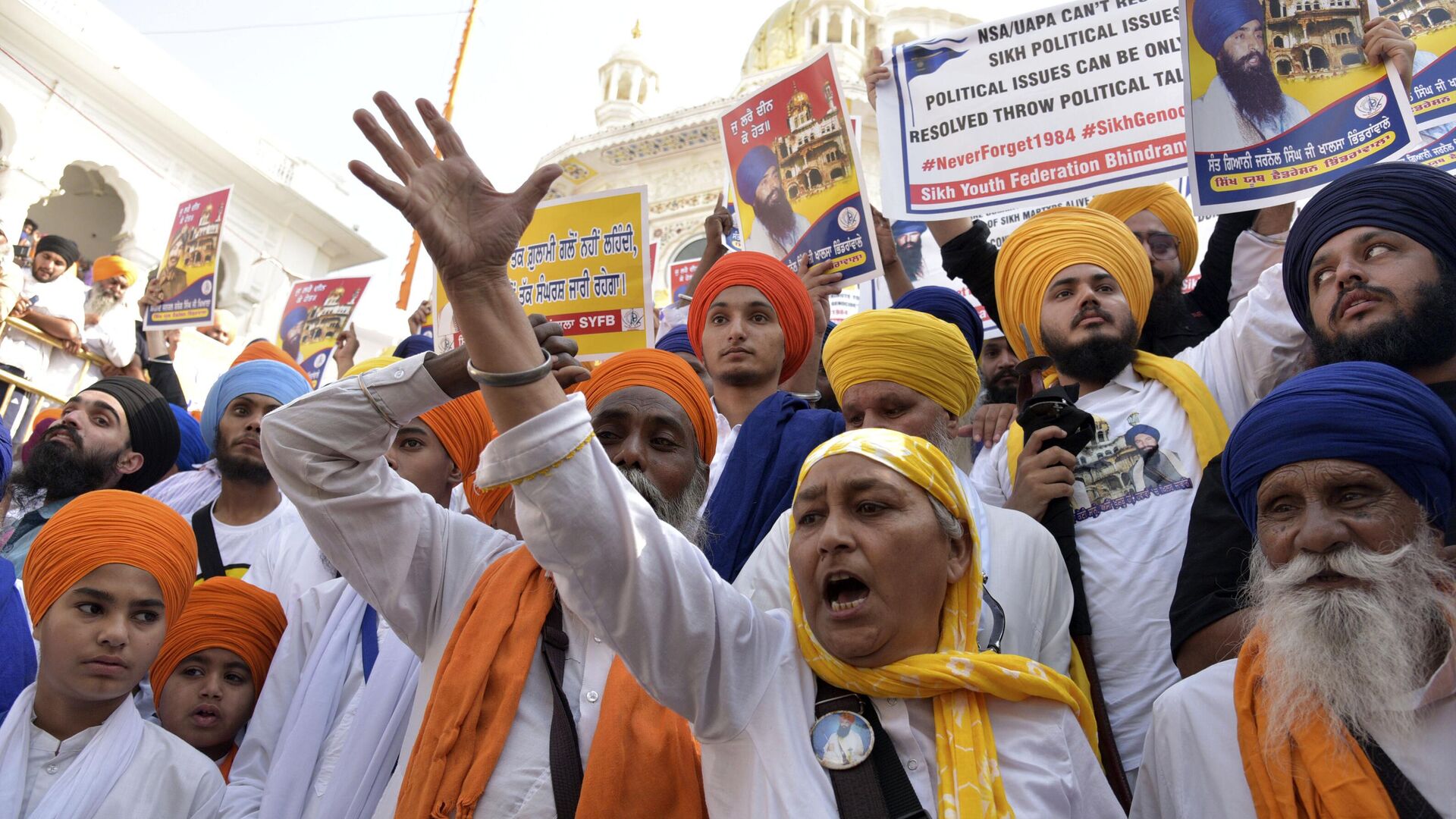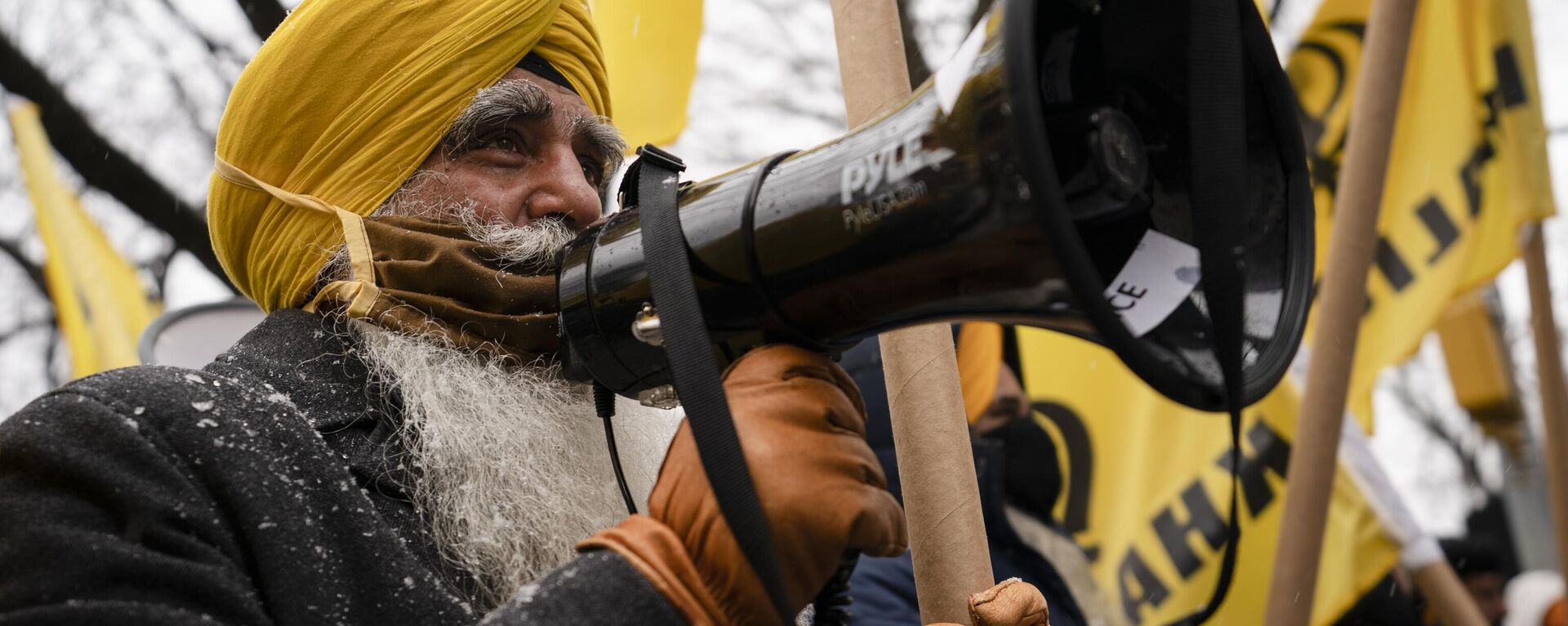https://sputniknews.in/20231004/canada-us-creating-undue-pressure-on-south-asian-nations-bangladesh-ex-pm-aide-4599565.html
Canada, US Creating ‘Undue Pressure’ on South Asian Nations: Bangladesh Ex-PM Aide
Canada, US Creating ‘Undue Pressure’ on South Asian Nations: Bangladesh Ex-PM Aide
Sputnik India
Bangladesh and Sri Lanka have backed India in its ongoing diplomatic row with Canada. The western allies have for long ignored terror-related concerns of these nations.
2023-10-04T17:11+0530
2023-10-04T17:11+0530
2023-10-04T17:11+0530
sheikh hasina
justin trudeau
joe biden
canada
bangladesh
india
g7
sri lanka
south asia
terror charges
https://cdn1.img.sputniknews.in/img/07e7/07/06/2870196_0:130:3178:1918_1920x0_80_0_0_6d7b3cb574fe054ebbcd6cac598120a7.jpg
A former Bangladesh Prime Ministerial advisor has criticized the Canadian and other western governments for their “double standards” in application of human rights and democratic ideals.Iqbal Sobhan Chowdhury, a former advisor to Bangladesh’s Prime Minister Sheikh Hasina, told Sputnik India that western countries, including the US, have had a tendency of creating “undue pressure” on south Asian nations in the garb of human rights.Chowdhury criticized the US sanctions against senior officials of Bangladesh’s elite counter-terror and anti-drug trafficking agency Rapid Action Battalion (RAB) in 2021, as well as the current US visa restrictions put in place by the State Department in the lead-up to federal election in the south Asian nation this month.Last month, the Biden administration slapped senior Bangladeshi officials and ruling party politicians with visa restrictions for “undermining the democratic election process in Bangladesh”.Both the policy decisions by the Biden administration have been criticized by Prime Minister Hasina.Western Countries ‘Look Down’ Upon Bangladesh’s Law ProcessIn the case of Canada, Bangladesh has been unsuccessfully urging the G7 country for over a decade to repatriate the killer of former Bangladesh’s first Prime Minister Sheikh Mujibur Rahman, the father of current leader Sheikh Hasina.In 2009, a Bangladesh court convicted 11 people, including Noor Chowdhury and Rashid Chowdhury, in the assassination of Rahman, who was killed in 1975.What’s more, the Bangladesh foreign minister has revealed that Canada has even refused to provide the citizenship status of Noor with Bangladeshi authorities. Rashid, the other killer, has been accorded the American citizenship, Momen said in the media interview.The Case of Sri LankaChowdhury also backed Sri Lanka’s concerns about the activities of pro-LTTE (Liberation Tigers of Tamil Eelam) separatists based in Canada, Australia as well as European capitals.While the Sri Lankan Army defeated the LTTE insurgency in 2009, many LTTE sympathizers have found refuge in Canada among other western countries.A major diplomatic row was triggered between Canada and Sri Lanka after the Canadian Parliament commemorated the “Tamil Genocide Remembrance Day” on 18 May.Sri Lanka not only rejected the charge but also accused Trudeau of fomenting “disharmony and hatred both in Canada and Sri Lanka, instead of promoting peace and reconciliation”.In the wake of India-Canada row last month, Sri Lankan foreign minister Ali Sabry once again slammed Trudeau for making an “outrageous claim” against India without furnishing any proof to New Delhi.“The same thing they did for Sri Lanka, a terrible, total lie about saying that Sri Lanka had a genocide. Everybody knows there was no genocide in our country,” Sabry said last month.Canada Has ‘Impinged on India’s Sovereignty’ by Harbouring Sikh SeparatistsChowdhury backed New Delhi’s stance in its ongoing diplomatic row with Ottawa, stating that the Canadian authorities have impinged upon India’s “sovereignty” by providing safe refuge to radical Sikh activists and groups advocating secession.He described the diplomatic row as “unfortunate and unexpected”.“Both India and Canada are strong democracies and have enjoyed good ties till now, underpinned by shared democratic values. However, Canada’s actions in the case aren’t reflective of how a government should deal with another friendly government,” he added.The row was sparked after Trudeau told the Parliament last month that Indian government “agents” were linked to the killing of pro-Khalistan activist Hardeep Singh Nijjar, a Sikh temple leader in British Columbia but a designated terrorist in India.Significantly, the Biden administration has urged India to cooperate with Canada's investigation on several occasions, although New Delhi has rejected Ottawa's charge. Canada is yet to provide any concrete claims to India in the Nijjar case, according to Ministry of External Affairs (MEA).Chowdhury remarked that Canada can’t claim to be standing for human rights and democratic values if it refused to abide by concerns of India, the world’s biggest democracy.“If Indian government starts harbouring Canadian secessionists and refuses to act against them as Canada has been doing, then we would have seen a different reaction from them altogether,” he added.Chowdhury held up the example of Prime Minister Hasina, who he highlighted has adopted a “zero tolerance policy” towards secessionists from India seeking a safe haven in Bangladesh.
https://sputniknews.in/20231003/khalistan-row-shows-us--allies-must-respect-indias-strategic-autonomy-expert-4584775.html
canada
bangladesh
india
sri lanka
south asia
indo-pacific
Sputnik India
feedback.hindi@sputniknews.com
+74956456601
MIA „Rossiya Segodnya“
2023
Dhairya Maheshwari
https://cdn1.img.sputniknews.in/img/07e6/0c/13/138962_0:0:641:640_100x100_80_0_0_2cb44360dbcdf6d84bf4b299cd045917.jpg
Dhairya Maheshwari
https://cdn1.img.sputniknews.in/img/07e6/0c/13/138962_0:0:641:640_100x100_80_0_0_2cb44360dbcdf6d84bf4b299cd045917.jpg
News
en_IN
Sputnik India
feedback.hindi@sputniknews.com
+74956456601
MIA „Rossiya Segodnya“
Sputnik India
feedback.hindi@sputniknews.com
+74956456601
MIA „Rossiya Segodnya“
Dhairya Maheshwari
https://cdn1.img.sputniknews.in/img/07e6/0c/13/138962_0:0:641:640_100x100_80_0_0_2cb44360dbcdf6d84bf4b299cd045917.jpg
khalistan referendum, khalistan news, khalistan flag, khalistan movement, expulsion of canadian diplomats, canadian diplomats in india, canada news, india news, nijjar case, nijjar killing, us visa policy, canada india news, canada india issue, canada india news latest, bangladesh news, sri lanka news, us visa policy for bangladesh, sheikh hasina, ltte war
khalistan referendum, khalistan news, khalistan flag, khalistan movement, expulsion of canadian diplomats, canadian diplomats in india, canada news, india news, nijjar case, nijjar killing, us visa policy, canada india news, canada india issue, canada india news latest, bangladesh news, sri lanka news, us visa policy for bangladesh, sheikh hasina, ltte war
Canada, US Creating ‘Undue Pressure’ on South Asian Nations: Bangladesh Ex-PM Aide
Bangladesh and Sri Lanka have backed India in its ongoing diplomatic row with Canada. The western allies have for long ignored terror-related concerns of these nations.
A former Bangladesh Prime Ministerial advisor has criticized the Canadian and other western governments for their “double standards” in application of human rights and democratic ideals.
Iqbal Sobhan Chowdhury, a former advisor to Bangladesh’s Prime Minister Sheikh Hasina, told Sputnik India that western countries, including the US, have had a tendency of creating “undue pressure” on south Asian nations in the garb of human rights.
“The western countries in one way of the other are trying to create undue pressure on South Asian nations through duplicitious application of human rights and law,” remarked Chowdhury.
Chowdhury criticized the
US sanctions against senior officials of Bangladesh’s elite counter-terror and anti-drug trafficking agency Rapid Action Battalion (RAB) in 2021, as well as the current US visa restrictions put in place by the State Department in the lead-up to federal election in the south Asian nation this month.
Last month, the Biden administration slapped senior Bangladeshi officials and ruling party politicians with visa restrictions for “undermining the democratic election process in Bangladesh”.
Both the policy decisions by the Biden administration have been criticized by Prime Minister Hasina.
“As a friendly, democratic nations, the western countries can advise us on these matters, which we would take in right spirit. But these pressure tactics adopted by them impinge on the sovereignty of our nations,” Chowdhury stated.
Western Countries ‘Look Down’ Upon Bangladesh’s Law Process
In the case of Canada, Bangladesh has been unsuccessfully urging the G7 country for over a decade to repatriate the killer of former Bangladesh’s first Prime Minister Sheikh Mujibur Rahman, the father of current leader Sheikh Hasina.
“They look down upon the Bangladesh’s law process,” he stated.
In 2009, a Bangladesh court convicted 11 people, including Noor Chowdhury and Rashid Chowdhury, in the assassination of Rahman, who was killed in 1975.
Bangladesh’s foreign minister AK Abdul Momen said in a media interview last week that Dhaka’s repeated appeals to Canada to repatriate Noor have gone unheeded till date.
What’s more, the Bangladesh foreign minister has revealed that Canada has even refused to provide the citizenship status of Noor with Bangladeshi authorities. Rashid, the other killer, has been accorded the American citizenship, Momen said in the media interview.
Chowdhury also backed Sri Lanka’s concerns about the activities of pro-LTTE (Liberation Tigers of Tamil Eelam) separatists based in Canada, Australia as well as European capitals.
While the Sri Lankan Army defeated the LTTE insurgency in 2009, many LTTE sympathizers have found refuge in Canada among other western countries.
A
major diplomatic row was triggered between Canada and Sri Lanka after the Canadian Parliament commemorated the “Tamil Genocide Remembrance Day” on 18 May.
“Canada will not stop advocating for the rights of the victims and survivors of this conflict, as well as for all in Sri Lanka who continue to face hardship,” Canadian Prime Minister Justin Trudeau said in his message.
Sri Lanka not only rejected the charge but also accused Trudeau of fomenting “disharmony and hatred both in Canada and Sri Lanka, instead of promoting peace and reconciliation”.
In the wake of India-Canada row last month, Sri Lankan foreign minister Ali Sabry once again slammed Trudeau for making an “outrageous claim” against India without furnishing any proof to New Delhi.
“The same thing they did for Sri Lanka, a terrible, total lie about saying that Sri Lanka had a genocide. Everybody knows there was no genocide in our country,” Sabry said last month.
Canada Has ‘Impinged on India’s Sovereignty’ by Harbouring Sikh Separatists
Chowdhury backed New Delhi’s stance in its
ongoing diplomatic row with Ottawa, stating that the Canadian authorities have impinged upon India’s “sovereignty” by providing safe refuge to radical Sikh activists and groups advocating secession.
He described the diplomatic row as “unfortunate and unexpected”.
“It was surprising that Canada chose to voice its concerns in public rather than taking it up with New Delhi in private, that too after the successful hosting of the G20 Summit by the Indian presidency,” said the former PM advisor.
“Both India and Canada are strong democracies and have enjoyed good ties till now, underpinned by shared democratic values. However, Canada’s actions in the case aren’t reflective of how a government should deal with another friendly government,” he added.
The row was sparked after Trudeau told the Parliament last month that Indian government “agents” were linked to the killing of pro-Khalistan activist Hardeep Singh Nijjar, a Sikh temple leader in British Columbia but a designated terrorist in India.
Significantly, the Biden administration has
urged India to cooperate with Canada's investigation on several occasions, although New Delhi has rejected Ottawa's charge. Canada is yet to provide any concrete claims to India in the Nijjar case, according to Ministry of External Affairs (MEA).
Chowdhury remarked that Canada can’t claim to be standing for human rights and democratic values if it refused to abide by concerns of India, the world’s biggest democracy.
“Canada has refused to act against radical Sikhs who have been backing secessionist demands. This reeks of double standards from the western countries, who claim to be strong defenders of human rights and democratic values,” the former PM advisor noted.
“If Indian government starts harbouring Canadian secessionists and refuses to act against them as Canada has been doing, then we would have seen a different reaction from them altogether,” he added.
Chowdhury held up the example of Prime Minister Hasina, who he highlighted has adopted a “zero tolerance policy” towards secessionists from India seeking a safe haven in Bangladesh.
“The Sheikh Hasina government has adopted a zero-tolerance policy towards activities of Indian insurgents. This is what one should expect from Canadian government too,” the former PM aide stated.



